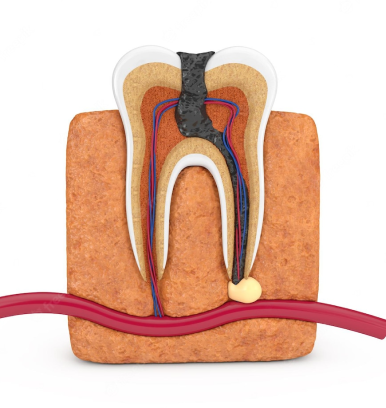What is an endodontist?
Endodontists are dentists who specialize in diagnosing and treating tooth pain, disease, and infection. They have extra training that helps them perform root canals, a special procedure designed to save an infected or decayed tooth.
What Does an Endodontist Do?
An endodontist is a specialist who treats problems with the inside of the tooth, known as the "tooth pulp." This area contains blood vessels, nerves, and connective tissue. It can become inflamed or infected due to deep tooth decay, a traumatic injury to the tooth, or repeated dental work on the tooth. If left untreated, the pulp will become painful and the tooth will eventually die. A root canal is the most common procedure performed by an endodontist. This involves removing the damaged or infected nerve and tooth pulp. Dentists can also perform root canals, but endodontists have more experience with this procedure.

Education and Training
Endodontists are dentists who have specialized in diagnosing and treating tooth pain. They have had two or three more years of training beyond dental school, during which they focus on endodontics. They may also receive a Master of Science in Dentistry.
This process involves completing
-
Four years in dental school
-
Two to three years in a post-graduate residency program
-
An exam to become certified by the American Board of Endodontics
Reasons to See an Endodontist
Your general dentist may refer you to an endodontist for a few common reasons:
Tooth pain and sensitivity to heat and cold.
If bacteria gets into the pulp of a tooth through small openings, it can cause inflammation or a bacterial infection. This is the most common reason people see an endodontist
If you have a tooth that has been knocked out of its socket or is otherwise injured, an endodontist may be able to save the tooth by placing it back in the socket and stabilizing it. In many cases, a root canal will also be necessary.
If a large section of your tooth is missing, you may need a root canal to protect the exposed pulp from bacteria.
What to Expect at the Endodontist
You will likely need to see an endodontist to get a root canal. Here is what you can expect during the visit: you will be given a local anesthetic to numb the mouth so you don't feel pain during the procedure. A dental dam will be placed around the tooth, and the endodontist will open the crown of the tooth to remove the pulp. They will then clean, reshape, and enlarge the root canal with small files. The endodontist may also apply medicine to the area to stop an infection. They will fill the root canal with a rubber substance that acts as a bandage, and then fill the tooth opening with a temporary crown or filling. After the procedure, you may feel mild pain. Over-the-counter pain relievers should help. You will return to the endodontist at a later date to have them remove the temporary crown or filling and fit you with a permanent one.
References
1. "Current challenges and concepts in the preparation of root canal systems: A review." Journal of Endodontics, 2014.
2. "Endodontic diagnosis: A review." Journal of Endodontics, 2009.
3. "Root canal obturation: A review of current technologies and techniques." Journal of Endodontics, 2006
4. "Microbial flora of root canal systems: A review." Journal of Endodontics, 2004.
5. "Management of traumatic dental injuries: A review." Journal of Endodontics, 2014.
6. "Endodontic therapy in elderly patients: A review." Journal of Endodontics, 2012.
7. "Current challenges and concepts in the management of apical periodontitis: A review." Journal of Endodontics, 2015.
8. "Endodontic treatment outcomes: A longitudinal study of 1,200 teeth." Journal of Endodontics, 2013.
9. "Regenerative endodontics: A review of current status and a call for action."Journal of Endodontics, 2014.
10. "Endodontic and esthetic management of maxillary lateral incisors with dens invaginatus: A case report and review of literature." Journal of Endodontics, 2012.

